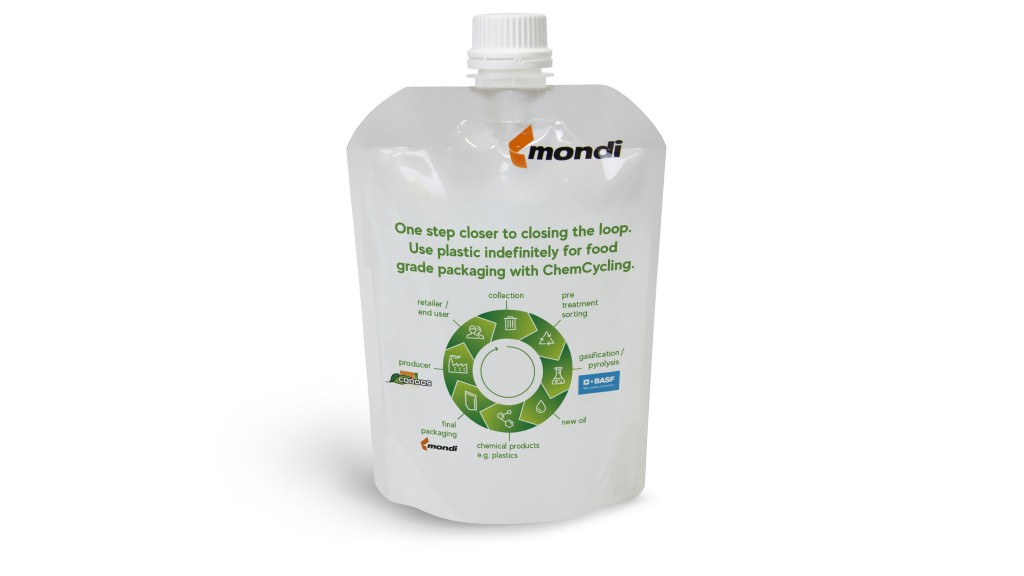BASF ChemCycling process uses post-consumer plastic waste to produce virgin grade material
Pilot project takes steps toward flexible food contact approved packaging from plastic waste

ChemCycling is the name of a new pilot project, being undertaken in partnership with Mondi, the global packaging and paper group, and COROOS, a food-industry supplier, by which Germany-based chemical producer BASF is further developing their process for the chemical recycling of plastic waste. Plastic waste that is difficult to recycle, such as mixed or contaminated plastics, is converted into a pyrolysis oil through thermochemical processes. This secondary raw material can be used as input in BASF's production process, thereby partly replacing fossil resources, to manufacture numerous chemical products.
Together, the companies have produced a stand-up pouch that is safe for food contact, and partly made with raw material derived from chemically recycled plastic. Until now, according to BASF, recycling plastic has been mainly mechanical, limiting the scope of plastics that can be recycled and limiting the number of products that can be created with recycled material, in particular for the strict legal European regulations in place for food packaging.
Mondi believes that packaging should be sustainable by design, using paper where possible, and plastic when useful. For food protection and extending shelf life, plastic is often the best choice because of its barrier properties. These requirements make it difficult to use mechanically recycled plastic due to potential impurities and plastic flaws that can occur in the layers, limiting the applicability for food contact.
"BASF is working on advancing the chemical recycling of plastic waste, because this will make it possible to process and reuse plastics that are currently difficult to recycle such as mixed plastics," explained Christoph Gahn, who is responsible for the polyamide business at BASF. "This prototype packaging which is based on pyrolysis oil derived from waste plastic shows that the life cycle of consumer plastics, including multilayer packaging, could become a closed loop."
As a leader in the flexible packaging market, Mondi says they partnered with BASF to produce their virgin grade material into a multi-layer laminate for food packaging, for COROOS private label products as well as their own A-brand, Servero.
In the manufacturing process, according to Mondi, 100% of the fossil feedstock was replaced by pyrolysis oil derived from mixed recycled material, for one of the inner layers of the packaging (oriented polyamide, OPA-12 mm). In total 12% of the packaging weight is made of ChemCycled material.
Graeme Smith, Sustainability Manager for Mondi Consumer Packaging, explained more about the pilot project: "It is important to show proof of concept when establishing breakthrough developments, and for chemical recycling it is an essential part of the roadmap to commercialising this process in the future."
"COROOS is partnering in this project because we care about sustainability and are looking into different options to improve our footprint, by using packaging from recycled materials, packaging materials being recyclable and/or by being re-usable," shared Elke Schroevers, the Marketing Manager of COROOS. With this development, the way is paved for plastic waste to become a new resource for flexible packaging while replacing fossil fuels.
Physical samples have been produced during a recent line trial by COROOS, and were presented at FachPack in Nuremberg, Germany, taking place this week, from 24-26th of September.
Company info
Building 1, 1st floor Aviator Park, Station Road
Addlestone, Surrey,
GB, KT15 2PG
Website:
mondigroup.com/en/home




